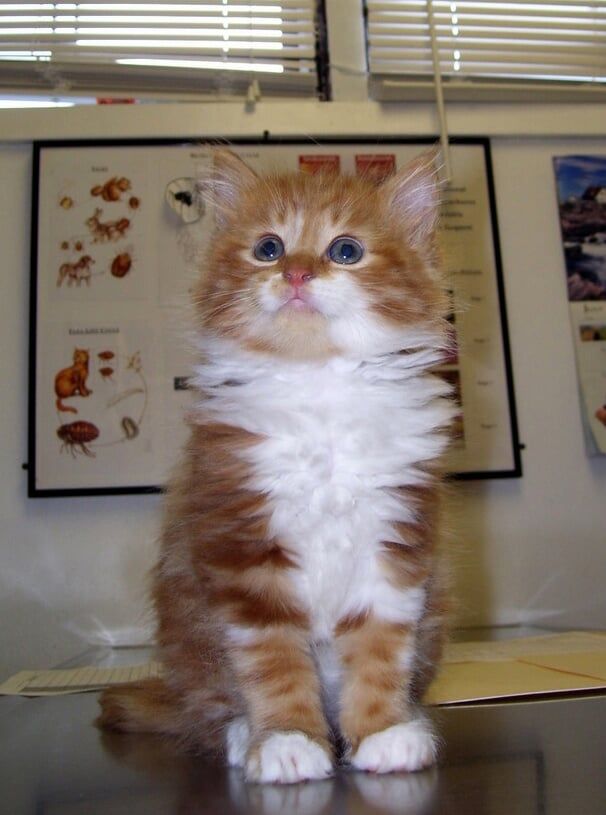EXPERT VETERINARY SERVICES IN RAHWAY, NEW JERSEY
WELLNESS EXAMS:
Return to Top
We recommend that all pets be given wellness exams at least twice a year. This exam includes a thorough physical examination in which eyes, ears, nose, throat, skin and coat, heart auscultation, and oral exam to detect gingivitis and dental plaque. This helps to detect any underlying or silent conditions that can be cured early on and the pet is spared the pain and agony. The doctor may recommend measures like X-Rays, blood tests to diagnose and rectify any problems.
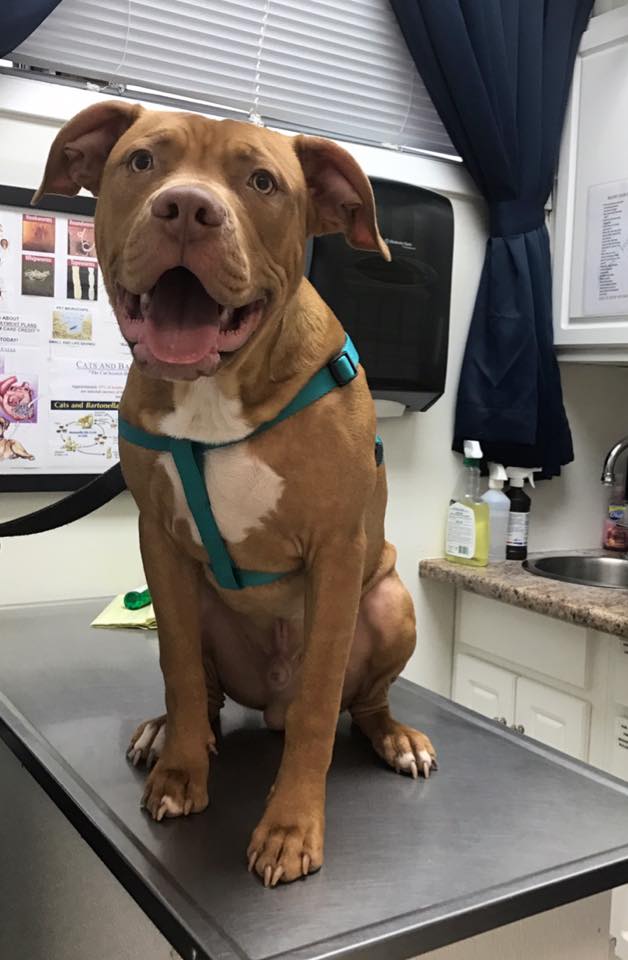
Return to Top
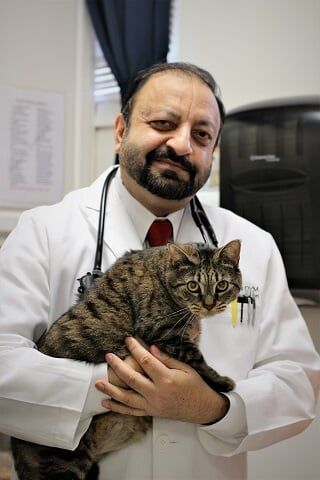
The following is a brief description of the different body functions that are assessed in a Complete Physcial Exam and why they are important for your pet's health.
1. Eyes, Ears, Nose, Throat: We are looking for infection, discharge, allergies, and parasites
2. Oral Exam, Dental Health: Check for gingivitis, dental problems, and periodontal disease
3. Heart & Lungs: Do auscultation, check for heart murmurs and lung abnormalities like pneumonia
4. Abdominal Palpation: May reveal abdominal masses, fluid, and/or pain5. Physicla Examination of Lymph Nodes: Screen for infections, cancer, and/or immune problems
6. Check Umbilicus and Inguinum for Hernias: Hernias may become very serious health issues
7. Skin and Hair Coat: Check for dandruff, allergies, parasites, and/or hormonal problems8. Interdigital Spaces: Allergies, infections, and/or masses
9. Carpi (wrists), Physical Abnormality: Arthritis, pain, range of motion, and/or developmental abnormalities
10. Elbows, (Instability/abnormality): Arthritis pain, dislocations, and/or developmental abnormalities
11. Shoulder Joints (Pain/abnormality): Arthritis pain, range of motion, dislocations, and/or developmental abnormalities
12. Tarsi (ankles): Arthritis pain, range of motion, dislocations, and/or developmental abnormalities
13. Knee Joint: Laxity of knee cap, cruciate ligament problems, arthritis, pain, range of motion
14. Coxal (hips) Joint Stability: Hip dysplasia, arthritis, laxity, and/or pain
15. Brief Neurological: Nerve problems, mentation, balance, perception, locomotion, sensation
16. Gait: Checks to see if the pet is walking normally, if there is any problem with posture
17. Genitals / Rectal Exam: Problems of prostate, testicles, rectal warts, anal gland problems, vaginal exam for discharge discharge and/or growths
18. Urinary / Reproductive: Obstructions, tumors, infections, pain, incontinence, and/or discharge
19. Body Score: Is the pet overweight, underweight, malnourished, or obese?20. Overall health evaluation and outlook: What can the pet owner expect?
2. Oral Exam, Dental Health: Check for gingivitis, dental problems, and periodontal disease
3. Heart & Lungs: Do auscultation, check for heart murmurs and lung abnormalities like pneumonia
4. Abdominal Palpation: May reveal abdominal masses, fluid, and/or pain5. Physicla Examination of Lymph Nodes: Screen for infections, cancer, and/or immune problems
6. Check Umbilicus and Inguinum for Hernias: Hernias may become very serious health issues
7. Skin and Hair Coat: Check for dandruff, allergies, parasites, and/or hormonal problems8. Interdigital Spaces: Allergies, infections, and/or masses
9. Carpi (wrists), Physical Abnormality: Arthritis, pain, range of motion, and/or developmental abnormalities
10. Elbows, (Instability/abnormality): Arthritis pain, dislocations, and/or developmental abnormalities
11. Shoulder Joints (Pain/abnormality): Arthritis pain, range of motion, dislocations, and/or developmental abnormalities
12. Tarsi (ankles): Arthritis pain, range of motion, dislocations, and/or developmental abnormalities
13. Knee Joint: Laxity of knee cap, cruciate ligament problems, arthritis, pain, range of motion
14. Coxal (hips) Joint Stability: Hip dysplasia, arthritis, laxity, and/or pain
15. Brief Neurological: Nerve problems, mentation, balance, perception, locomotion, sensation
16. Gait: Checks to see if the pet is walking normally, if there is any problem with posture
17. Genitals / Rectal Exam: Problems of prostate, testicles, rectal warts, anal gland problems, vaginal exam for discharge discharge and/or growths
18. Urinary / Reproductive: Obstructions, tumors, infections, pain, incontinence, and/or discharge
19. Body Score: Is the pet overweight, underweight, malnourished, or obese?20. Overall health evaluation and outlook: What can the pet owner expect?

When your pet comes to Clark Animal Hospital
for a "vaccination visit" or a "wellness exam" a general examination is done. Particular attention is paid to any health complaints that are brought to the attending doctor's attention by the pet owner. Those exams are generally geared towards solving the presenting health problem at hand. A complete physical exam (C.P.E.) is neither necessary nor performed on your pet every time he or she comes in. A C.P.E. is only performed if the owner specifically requests it to be done or the doctors think that it is in the pet's best interest and the pet owners allow it. We at Clark Animal Hospital strongly recommend a C.P.E. for all new pets, regardless of age. It is also recommended that pets receive a C.P.E. once every two years, starting at the age of six.
Canine & Feline Dental Health
Return to Top
Do most pets have dental problems?
Dental disease is the most common disease in dogs and cats. Over 68% of all pets over the age of three have some form of periodontal or dental disease. Most pets will show few signs of dental disease. It is up to the pet's family and veterinarian to uncover this hidden and often painful condition.
Dental disease is the most common disease in dogs and cats. Over 68% of all pets over the age of three have some form of periodontal or dental disease. Most pets will show few signs of dental disease. It is up to the pet's family and veterinarian to uncover this hidden and often painful condition.
What can happen if I do not have my pet's teeth routinely cleaned?
Periodontal disease and Gingivitis can lead to Bone Loss, Heart Disease (endocardiosis), Kidney Infections, Pancreatic Infections, Liver Infections, and Shortening of Life Span.
Periodontal disease and Gingivitis can lead to Bone Loss, Heart Disease (endocardiosis), Kidney Infections, Pancreatic Infections, Liver Infections, and Shortening of Life Span.
Periodontal disease is a term used to describe inflammation or infection of the tissues surrounding the tooth. Accumulation of tartar and calculus on the teeth contributes to gum recession around the base of the tooth. Infection soon follows and the gums recede, exposing sensitive unprotected tooth surfaces. Untreated infection then spreads into the tooth socket and ultimately the tooth loosens and is lost.
What is dental tartar and how can I prevent it?
The mouth of all mammals is home to thousands of bacteria. Many of these bacteria will breed on the surfaces of the tooth and form an invisible layer called plaque or biofilm. Some of this is removed naturally by the pet's tongue and chewing habits but if allowed to remain on the tooth surface, the plaque thickens, becomes mineralized and is then visible as tartar and ultimately calculus. The tartar presses on the gums, which recede, causing inflammation and infection called gingivitis. The gums continue to recede until ultimately the tooth socket is infected and the tooth is lost.
As the oral infection increases, tonsillitis and pharyngitis can also occur. In addition, the bacteria are absorbed into the blood stream and can be carried to other organs. Heart valve infections (endocardiosis or endocarditis), kidney and liver problems are frequently caused by “bad teeth”.
What is involved with a dental cleaning for my cat or dog?
The goal of dental scaling and polishing is to remove the tartar and invisible plaque. Clark Animal Hospital will perform pre-anesthetic blood tests to ensure that kidney and liver function are satisfactory for anesthesia. Sometimes antibiotic treatment is instituted before a full dental prophylaxis is carried out. Clark Animal Hospital will discuss the specific pre-dental recommendations for your pet.
Tooth scaling will be performed using both hand scalers and ultrasonic cleaning equipment to remove tartar both above and below the gum line. The tartar beneath the gum line causes the most significant gum recession. The teeth are then polished in order to help prevent subsequent plaque build-up. It may be necessary to carry out other procedures such as extractions at the same time. Special applications such as fluoride, antibiotic preparations and cleaning compounds may be indicated to decrease tooth sensitivity, strengthen enamel and reduce plaque accumulation and bacterial infection.
These procedures will be fully discussed both before your pet's dental cleaning and when you bring your pet in for the procedure. Since it can be difficult to predict the extent of dental disease in advance of the procedure, it is imperative that a Clark Animal Hospital representative is able to reach you during the procedure to discuss any additional treatment that may be necessary.
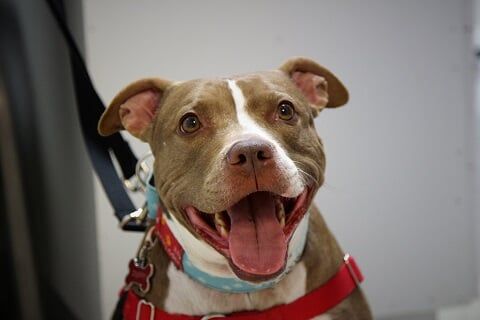
Do I have to make an appointment for my dog to have a dental scaling and polishing?
Yes. Clark Animal Hospital will perform pre-anesthetic blood tests, examine your pet for any other underlying disorders prior to the procedure, and determine if antibiotic treatment should be started in advance.
How can I prevent tartar formation on my cat or dog's teeth?
After your pet's teeth have been cleaned, we recommend beginning home dental care to help reduce plaque and tartar buildup. Below are some great recommendations to help maintain dental health in your pet. Feel free to stop by our hospital and we will let you know which is best for your pet.
As part of the home dental care, we recommend that you feed your pet a veterinary-approved dental diet such as Prescription Diet® t/d®. Diets like this one have been shown to greatly reduce plaque formation and tartar buildup because of it's kibble's special fiber matrix that scrubs the exposed tooth surface like an edible toothbrush, reducing bacteria-laden plaque. By preventing plaque as it forms, tartar buildup is greatly diminished. Clark Animal Hospital carries a full stock of both feline and canine Prescription Diet t/d pet food.
Brushing your pet's teeth is another effective means of removing plaque before it turns into tartar. We recommend using a toothpaste made especially for pets. Brushing should be done at least twice weekly (preferably daily), but we understand that not all pets will tolerate it. Special finger brushes are made that make this task easier for you and your pet.
Use a daily oral rinse which is available at Clark Animal Hospital. This type of product helps reduce the bacterial count in the mouth, resulting in improved breath and lower plaque buildup.
Having Clark Animal Hospital perform regular professional dental cleaning under general anesthesia every six to twelve months or at the first sign of tartar buildup is extremely beneficial to most pets. This will prevent damage to the gums and tooth roots, maintain good oral health, help prevent periodontal disease, and help maintain fresh breath.
LABORATORY
Return to Top
We have an in-house laboratory where we can do tests quickly and accurately on state of the art equipment. These include critical tests like blood chemistry, blood gas analysis, and other in-house tests like lyme disease tests, heartworm disease tests, feline disease testing (leukemia and aids), microscopic slide readings, urine testing, and stool tests.
The results are available within a few minutes while you wait. Some samples may be sent to Antech Laboratories, which is one of the largest and most reputable veterinary laboratories in the U.S.A.
We have arranged for their courier to come twice a day to Clark Animal Hospital, collect all test samples so that your pet's results can be reported to us the same or very next day.
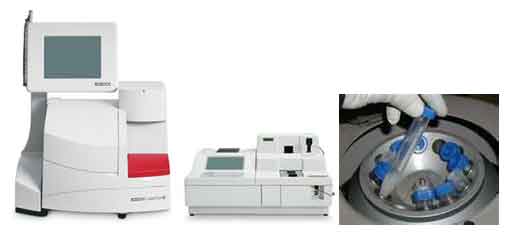
Some test results take longer to report, such tests include Cat Scratch Disease testing, Cultures, and biopsies. These results are usually available within 3 - 7 days, unless otherwise specified.
ENDOSCOPY
Return to Top
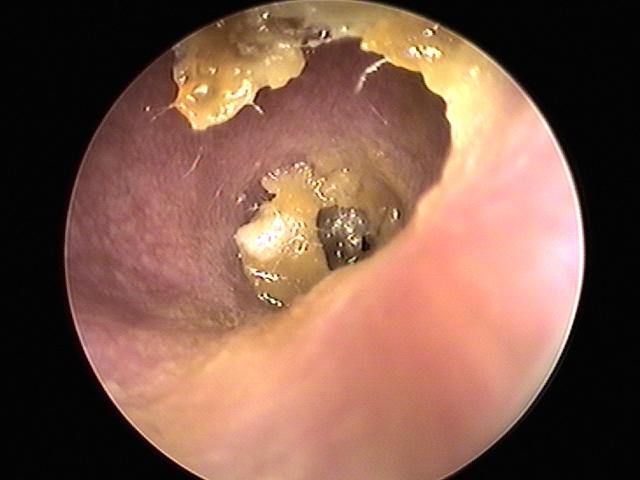
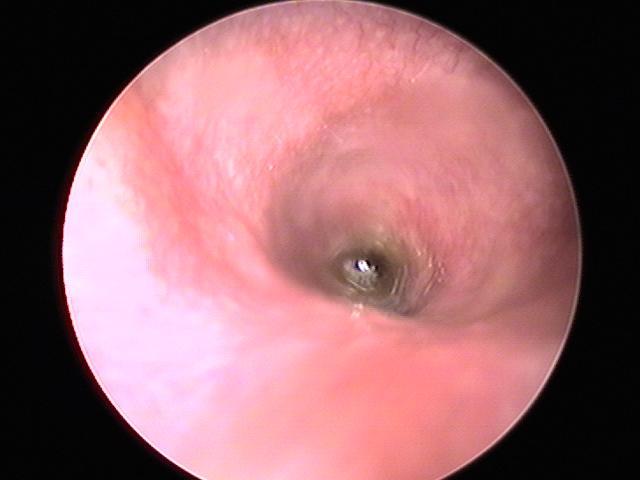
Picture of Canine Ear Canal (left = before professional ear flush, right = after)
This is a diagnostic method (the instrument/tool used is Endoscope) in which we insert a fiber optic tube that has a tiny camera and a surgical instrument at its tip, into a hollow organ and picture the organ from inside. In this method, we are seeing the ACTUAL view of the organ. If we feel that an organ has an abnormality, we can take a biopsy right then and there. This is an invaluable tool for an early diagnosis and intervention to help your pet. We can call in a specialist to do this procedure.
ULTRASOUND
Return to Top
This is the best non-invasive diagnostic tool to view and evaluate organs like heart, stomach, intestines, gall bladder, urinary bladder and blood vessels. While an X-ray shows a black and white film of the organs, an ultrasound gives you a picture of the inside, and measures the size of heart walls and valves, and measures the velocity of blood in each chamber of the heart. This is of immense help in evaluating the function of the heart. Similarly, it can measure and "see" inside any other organ of the body!Ultrasound gives us either analog or digital pictures. Here at Clark Animal Hospital, we have cutting edge digital ultrasound.
We can take ultrasound pictures of your pet, send them over the internet to a specialist, and have results the same day. This method of sending ultrasound pictures over the internet is called tele-medicine. This gives you the power to define the problem after doing non-invasive diagnostic evaluation, and possible life saving intervention right here in Clark Animal Hospital. For our Client's convenience, we also work with several board certified Veterinary Specialists who can perform your pet's ultrasound on-site at Clark Animal Hospital.
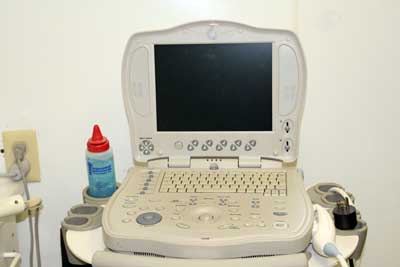
X-RAYS
Return to Top
This is the best diagnostic tool to evaluate "hard" parts of the body like bones, joints, skull, teeth, as well as kidney stones, gall bladder stones, foreign objects in the body, etc.
This is also a great way to evaluate relative position and size of organs in the body and conditions like tumors, pneumonia, etc.
All of our x-rays or sent to a board certified veterinary specialist for interpretation and a full report is sent to us in as little as 30 minutes.
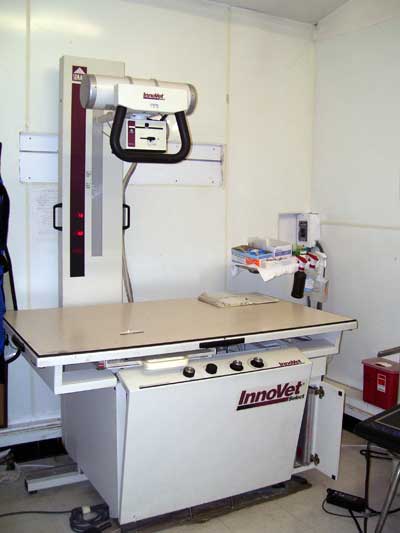
ELECTORCARDIOGRAMS (ECGs)
Return to Top
An ECG is the best way to diagnose some heart conditions like arrythmias (abnormalities in the heart rate/rhythm), electrical conductivity within the heart muscles, and the pace of the heart.
It is also an important method to detect abnormalities in the relative size of the cardiac chambers. When we obtain an ECG on your pet, it may be instantly transmitted to a board certified veterinary cardiologist for interpretation. The results are then reported to us in less than 30 minutes.
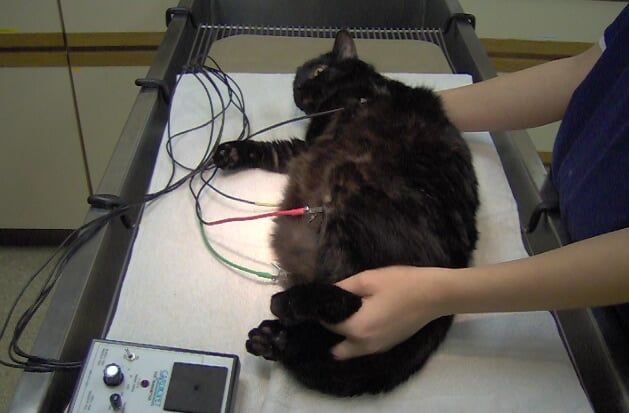
BLOOD PRESSURE AND OXYGEN LEVELS
Return to Top
We use state of the art Blood Pressure machines to monitor the blood pressures and oxygen concentrations in the blood of our animal patients. This is done for every surgery patient as well as for routine monitoring in heart patients .
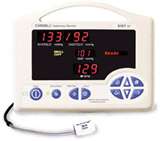
EYE PRESURE MONITORING
Return to Top
Clark Animal Hospital utilizes tonometers, a state of the art instrument that is usually used by human eye specialists, to measure the eye pressure in our dog and cat patients.
This enables us to diagnose glaucoma. Glaucoma can be treated and if not, it may lead to permanent blindness and even loss of the eyeball.
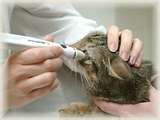
TELE-MEDICINE:
Return to Top
You will be glad to know that we are tele-medicine equipped. It means that we can send X-Rays, ECGs, Ultrasound reports to board certified veterinary specialists either right away on the high speed internet or in REAL TIME. In other words, we might be taking an ECG on your pet and it would be printed in the veterinary cardiologist's office. So, by the time we have finished doing the ECG on your pet, the ECG has already printed in the cardiologist's office, who may be located in NJ or in another state. Then, the specialist either phones or faxes me the results ASAP.
MICROCHIPPING
Return to Top
Millions of pets go missing every year, fewer than 25% are ever reunited with their families. Every year, millions of lost pets are either adopted by other families or, worse, destroyed (euthanized) due to the fact that proper authorities can not identify who the pets belong to.
Microchipping your pet also cuts down on travel delays. Nowadays in order for pets to travel via airplane they require a 15 digit microchip which is recognized internaionally.
Implanting a microchip is a very quick, simple, and inexpensive procedure that can help ensure that you and your pet will always find each other.
Microchipping your pet also cuts down on travel delays. Nowadays in order for pets to travel via airplane they require a 15 digit microchip which is recognized internaionally.
Implanting a microchip is a very quick, simple, and inexpensive procedure that can help ensure that you and your pet will always find each other.
HOW THE MICROCHIP SYSTEM WORKS
1. Clark Animal Hospital will implant a unique and personal microchip just under pet's skin between the should blades.
2. You recieve your pet's unique ID number.
3. You register your pet on PetLink at no additional cost.
4. If your pet is lost, whoever scans the microchip will obtain the animal's unique identification number which is then matched on PetLink.net
5. Once the animal is matched with the pet owner's information, you the pet owner will be contacted and notified that your beloved pet has been found.
6. You are reunited with your pet.
How is the microchip put into my pet?
Before insertion, the sterile microchip is scanned in the package to confirm that the identification code of the transponder is the same as that shown on the package bar code label.
Before insertion, the sterile microchip is scanned in the package to confirm that the identification code of the transponder is the same as that shown on the package bar code label.
The needle containing the microchip is loaded into the application gun or syringe, and the pet is positioned for the injection. For dogs and cats, the standard site for microchip placement is in the subcutaneous tissue along the dorsal midline (the spine) between the pet's shoulder blades. For correct placement, the pet should be either standing or lying on the stomach. Some of the loose skin between the shoulder blades is gently pulled up, and the needle is quickly inserted. The applicator trigger is depressed, injecting the transponder or microchip into the tissues.
Once the chip is inserted, the pet is scanned to ensure that the chip is reading properly and the identification number is checked. It is now a permanent and tamperproof method that cannot be lost.
Does it hurt to insert the chip?
The procedure is fast, safe, and appears to be relatively pain-free in most pets. The chips are usually inserted without incident, even in the tiniest kittens and puppies. The application needle is quite large, and some clients will choose to have the microchip implanted at the time of sterilization, so that the pet can be anesthetized for the injection. However, this is not necessary, and the microchip can be implanted at any time that is convenient.
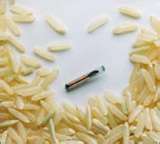
SENIOR PET EXAMS:
Return to Top
When is a pet considered senior? It depends upon the breed/size and age of the pet. Most pets are considered to be seniors after 6 years of age. Just like human senior citizens get regular check ups including blood tests, ECGs, chest X-Rays, arthritis checks, prostate checks, etc. our senior pets also need such monitoring and tests. Based on the diagnostic test results, early intervention in their ‘silent' conditions will make their lives healthier, happier, and longer. There are excellent drugs available for such senior pets' conditions as heart disease, asthma, arthritis, decreased mental acuity, incontinence, muscle weakness, etc.

TRAVEL CERTIFICATES
Return to Top
We no longer provide travel certificates or travel documents that are required for pets to travel internationally. Clark Animal Hospital is only providing Health Certificates for pets traveling within the U.S.A. However, we can still provide you and your pet with the needed vaccinations, testing or records needed for international travel, as requested by you.
Travelling is fun, let us make it safe also!
Some Safety Tips:

- Travel light.
- Take pets' medicines along.
- Keep your veterinarian's phone number handy 732-388-3379.
- Take all necessary papers (health certificate, vaccination records, export certificates etc.) with you.
- Getting out of car, keep your pet on a leash. For cats and small dogs, always carry them in a pet carrier.
- Do not let your pet be alone in a parked car.
- Keep a plastic bag and lots of paper napkins handy, in case your pet feels travel sickness.
- Make sure pets are well hydrated. Give them frequent urination/defecation breaks. Take along appropriate pooper-scoopers. Keep your pet on a leash while outside of your car.
- Look into buying a pet seat belt for your pet.
- Make sure your pet carrier is well secured and does not fall when you apply breaks or take a turn.
- Make sure that you have applied flea/tick/mosquito medicine on your pet, for adequate protection during travel/camping etc. Do not forget to give the heartworm medicine to prevent mosqito bite infections like heartworm infection
VACCINATIONS
Return to Top
'SHOTS' , 'DEWORMINGS', AND THE LIKES!
You deserve an excellent service at reasonable prices.
You deserve an excellent service at reasonable prices.
Vaccinations are necessary to minimize the risk of contagious diseases in your pets. Rabies vaccination is an absolute must and is required by law. The vaccination appointment once a year gives your pet an opportunity to get a checkup also. One year in a dog's life is approximately 7 years in a human's life. So, getting booster vaccinations every year is not that frequent actually!
PUPPIES AND DOGS
Puppies are given a Distemper combo vaccine at 6 weeks of age, 9 weeks, 12 weeks and possibly at 15 weeks of age. Distemper vaccine includes Distemper, Hepatitis, 4 Leptosires, Parvo virus, Parainfluenza, and Bordetella bronchiseptica vaccines. So, in reality, in CLARK ANIMAL HOSPITAL, to give your dog the maximum protection, we do a Distemper vaccine which is actually a combination of 9 vaccines. Of course, only one needle is given to the pet, because all these vaccines are combined together in one syringe. We do thousands of such vaccines every year.
After the last puppy shot, this Distemper vaccine is given every year for the rest of the life of the pet.
Lyme vaccine is a great way to prevent Lyme disease in your dog. We highly recommend it. It is done as a first shot to start the series any time after 3 months of age, then a second shot called a booster is given 2-3 weeks later, and then one single vaccine every year is given. This annual shot is usually given at the same time that your dog comes in for annual Distemper shot.
Rabies vaccine is required by law. The first shot is given at age of 3 months, and this is good only for one year. Next year, a booster Rabies vaccine is given which is good for 3 years. Each time a vaccine is given, we will give you a Certificate of Vaccination that enables you to register your pet with the local municipality. These certificates are also mandatory for travel to many places.
Worm treatments, called dewormings are done for puppies each time they come in for vaccinations, and for dogs monthly through Heartworm medicine.
** 3 YEAR VACCINATIONS AVAILABLE **
Cats and Kittens
Kittens are usually started on vaccinations at the age of 9 weeks. The booster shots are given at three week intervals, for two more boosters. So, by 3 months of age majority of vaccines are finished.
The usual vaccines are Feline Distemper and Feline leukemia. The Distemper vaccine is actually a 4 in 1 vaccine, consisting of Feline Viral Rhinotracheitis, Chlamydia, Calici virus, and Panleukopenia virus. The Feline Leukemia vaccine can be given as a separate vaccine or as a combined vaccine with Distemper. After the last kitten shot, these vaccines are given every year, once a year.
Cats that go outside should also get Feline Aids vaccine as well as feline Peritonitis vaccine. We highly recommend these vaccines for multi-cat households also.
Rabies vaccine is done at 3 months of age, repeated after one year and then every 3 years.
There are other vaccines available for cats. Talk to us about your individual circumstances and we will tailor-make a vaccination program just for your specific needs.
Worm treatments, called dewormings are done for kittens every time they come in for vaccinations; and for cats annually.
